I just put the linked post up at my website, lightsinthedarkness.net. Please go check it out!
http://lightsinthedarkness.net/?p=1387
I just put the linked post up at my website, lightsinthedarkness.net. Please go check it out!
http://lightsinthedarkness.net/?p=1387
I really hate it when I repeat myself, but the truth is I do it all the time. As much as I try to stop myself from telling the same stories or writing about the same topics, I catch myself doing it frequently. At least with what I’m about to write here, I realize I’m doing it, and I acknowledge it freely.
I know I have written here about dichotomous reasoning, but when I did it before it was in reference to that also being recognized as “black-and-white thinking.” Things were either good or bad, right or wrong, and there was no in-between. Dichotomous thinking also refers, however, to “all-or-nothing thinking.”
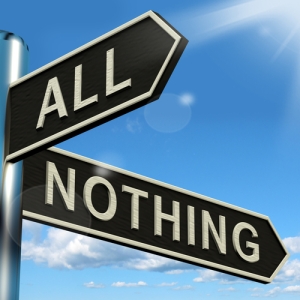 All-or-nothing thinking can manifest itself in a number of different ways. For example, there’s perfectionism, where a person might insist on knowing a project will turn out perfect or just not start it at all. My issue with all-or-nothing thinking is a pass/fail mentality. Either what I do or have done is a complete success or it is a total failure. There is no “pretty good” or “acceptable,” and there is no room for the possibility that an outcome I haven’t seen yet could come true. I either succeed or I fail, and that’s that.
All-or-nothing thinking can manifest itself in a number of different ways. For example, there’s perfectionism, where a person might insist on knowing a project will turn out perfect or just not start it at all. My issue with all-or-nothing thinking is a pass/fail mentality. Either what I do or have done is a complete success or it is a total failure. There is no “pretty good” or “acceptable,” and there is no room for the possibility that an outcome I haven’t seen yet could come true. I either succeed or I fail, and that’s that.
I have sort of a big week coming up, and I am trying my darndest to realize that the outcomes of upcoming events are not going to define me or lock me into an irreversible future I won’t be able to escape from. I’m also trying to remember that even if every plan I make this week goes awry, it does not mean that I am a complete failure, and it does not mean that I am doomed forever. Sounds easy enough, doesn’t it?
I wish it were that easy. The more I come to learn about dichotomous thinking, the more I realize it is one of the more insidious aspects of depression. It terrifies a person, mainly because they constantly feel as if they are on the brink of falling into utter ruin. Anytime I have lost a job or been passed over for an opportunity or gotten a poor grade on an exam or struck out in a baseball game, I felt like my life was over. It obviously wasn’t; I’m still here. But I live in this uncomfortable place most of the time, where it feels as if the knockout blow is just around the corner.
Tomorrow, I will try to kick off a week of keeping dichotomous thinking at bay. It’s already tugging at me, and it almost makes me want to just pass on some things out of sheer terror. I won’t know the results unless I try, though, so I just have to put one foot in front of the other and take things one step at a time. I need to repeat those words over and over and over…
I’ve experienced a rather unsettling revelation.
I hate someone.
This is not the first time this has happened, and I’m sure it won’t be the last. People, by nature, are almost designed to bump up against one another and cause friction. Arguments and misunderstandings and dirty deeds will continue to happen between human beings from now until the end of time. Grudges will be held, friendships will be severed, and dislike will bubble over into hatred time and time again.
Something feels different about this, though, and that’s what is bothering me. Like most all of us, I have been mistreated personally and professionally at various points in my life. I’ve been picked on, although I’m not sure I was ever bullied. I was put down verbally and made to feel worthless. In most of these instances, I knew who the people were. It wasn’t as if pain were being inflicted on me by strangers. I always managed a certain amount of disconnect somehow, though, as if these people were more constructs of things I didn’t like than antagonists capable of wounding me.
As the old saying goes, this time it’s personal.
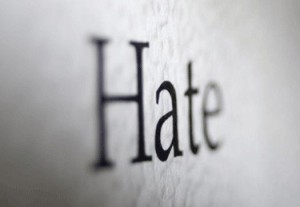 I’m not sure if fully realized hatred is possible in cases where trust has not been fully given. I’m not sure if a bona fide enemy can be acquired without some sort of relationship with a nemesis. I can’t imagine a deeper wound being inflicted by someone other than a friend, someone you have shared details of your life with and never dreamed they would ever do anything to hurt you.
I’m not sure if fully realized hatred is possible in cases where trust has not been fully given. I’m not sure if a bona fide enemy can be acquired without some sort of relationship with a nemesis. I can’t imagine a deeper wound being inflicted by someone other than a friend, someone you have shared details of your life with and never dreamed they would ever do anything to hurt you.
This happened to me. I still can’t actually believe it. I keep thinking I’m going to wake up one day to discover it didn’t actually happen. I did trust someone. I did have a relationship with someone. I was friends with someone. It feels strange talking about it in the past tense, but it’s true. That state of being is over, and I’m not sure it will ever come back.
It also feels strange to feel absolutely no remorse over feeling the way I do. Even now, I want to include a paragraph about how I feel bad about how I feel and how I wish I could figure out how to put things right. I would be lying, though. I feel nothing right now but blind rage, and I wish nothing but vengeance on this person. I at least have the morality left to not try to inflict that vengeance myself. It is difficult, though, to not stoop to that level. I want to be a wrecking ball, destroying every object of hate in my path.
This feeling is not fading. It feels as if it will last forever, and everything from common sense to religion to quotes in the Reader’s Digest are telling me to let it go. I can’t, though. I don’t even want to right now. Is this meanness? Is it sin? Is a byproduct of depression? Am I just not a very good person, or am I simply a human being who is having a very natural reaction to a terrible situation?
I hate not knowing the answer.
 Sometimes I wish I just had the flu.
Sometimes I wish I just had the flu.
You know, you have a sore throat, a fever, a cough, maybe even a little upset stomach. There are very visible, outside symptoms. You can go to the doctor, he (or she) can look at you and compare the data in front of them to what they learned in medical school and then make a reasonably well-informed guess as to what is wrong with you. Then they can write you a prescription that is time-tested to cure whatever it is that is ailing you, whether it is actually the flu or some other illness you’ve managed to contract. Lie down for a day or two, take your medicine, and next thing you know, you’re good as new.
If only problems with the human mind could be as easily solved.
As I have written here before, I was diagnosed a couple of years ago with dysthymia or dysthymic disorder. To show how quickly terminology can change in mental health, however, it is now known as “persistent depressive disorder.” I have tried out several medications in an attempt to curb the symptoms of this particular form of depression, experiencing varying degrees of success with each one. I am currently taking Abilify, which is technically not even an antidepressant, but it seems to be working fairly well for me. “Fairly well,” however, does not equal “very well,” so I made an appointment several months ago to see a psychiatric doctor about what I should be taking.
Now, before anyone becomes overly concerned about me, the term “psychiatric doctor” pretty much just means a counselor-type who can prescribe psychiatric drugs (Yes, I am aware I just totally insulted the profession with that dumbed-down description.). I was not wrapped up in any kind of straightjacket or confining clothing, and no one attempted to have me admitted to any kind of facility. The appointment was more like a friendly chat discussing my symptoms and what medicine (or medicines) might work best to combat them.
Have you ever been to see the doctor, though, nearly absolutely convinced you knew exactly what was wrong with you and what the doctor needed to do to cure you? I approached yesterday’s appointment with that type of mindset. I was depressed and had been experiencing some anxiety-like symptoms, so I figured I obviously needed to review antidepressant and anti-anxiety medications and let the doctor determine which ones would work best for me.
How in the world, then, did I walk out of there with a prescription for Adderall?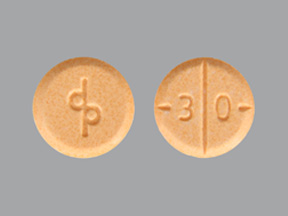
In case you’re not familiar with Adderall, it is most commonly used to treat narcolepsy and attention deficit hyperactivity disorder (better known as ADHD). I do get sleepy sometimes, but not enough to constitute a diagnosis of narcolepsy, so that only leaves you one guess as to why it was prescribed to me.
That’s right: Mr. Shy, Mr. Good Grades All Through School, Mr. Back of the Room at a Party was told yesterday he met five of the 10 criteria for adult ADHD.
Huh?
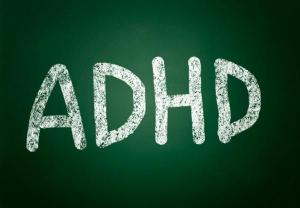 I thought people with ADHD were the ones who couldn’t shut up. I thought they were the ones who struggled with bad grades all through school. I thought they were the ones who couldn’t sit still for more than five minutes at a time. I don’t fit any of those descriptions. I just got A’s in my two master’s classes. Why do I have a prescription for Adderall now?
I thought people with ADHD were the ones who couldn’t shut up. I thought they were the ones who struggled with bad grades all through school. I thought they were the ones who couldn’t sit still for more than five minutes at a time. I don’t fit any of those descriptions. I just got A’s in my two master’s classes. Why do I have a prescription for Adderall now?
It actually makes more sense than it might initially seem. I have always had a bit of a wandering mind. I remember being young and my dad trying to teach me how to work on cars. I don’t remember a word of what he told me. I know even now during sermons or long lectures, I have a tendency to nod off or lose attention. I have a horrible time getting organized, and as much as I talk about wanting to be a writer, I never actually get focused enough to put anything down on paper (or computer screen). I can barely pick out a shirt to wear in the morning without having a low-level debate with myself.
This kind of scatteredness is what drew the doctor to his opinion that I might need to be treated for ADHD. Actually, it sort of came down to a coin flip between that and anxiety, and since anti-anxiety medicines sort of slow you down and I’ve been struggling with drowsiness lately, we decided to try the ADHD treatment first.
Today was my first day on the drug, so I’m still not sure how much of what I experienced were actual effects and how much was placebo. I do know I was much more awake than I have been for a quite some time, and I did tons of work at my computer today. On the sort of weird side, I didn’t eat anything between breakfast and dinner. Not a snack or anything. Didn’t even want food. I guess this could possibly be a positive, as I seem to gained a few pounds since I started taking Abilify. Kind of hoping it isn’t an everyday occurrence, though.
As with any drug, one day’s worth of results is not enough to measure the effects of taking it, so I still couldn’t tell you if attempting to lessen the effects of ADHD (which I may or may not even have) is the right way to go for me. There may be a complete reversal of treatment in my future. Or there may not be.
Sometimes I wish I just had the flu.
The Dreamworks Animation movie The Croods has become one of my children’s favorites. We must have watched it at least three times now, and it’s grown on me a little more each time I’ve seen it. I’m not sure why I resisted it in the first place. Maybe it’s because I’m not big on caveman stuff. Or maybe I’m just not a big Emma Stone fan. Whatever the case may be, it had to win me over … and it did.
I’m struck a little more each time I watch this movie by how much I identify with the 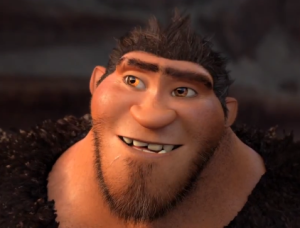 role of the father, Grug. (Just a side note: Nicolas Cage totally knocks this voice-over out of the park. It’s a shame it took an animated caveman movie to remind me what a great actor this guy can be.) Here is a guy just trying to do the right thing, even though he doesn’t even really understand why he’s doing it. He just knows he’s supposed to keep the family alive, and that’s all he concentrates on. He’s so absorbed in performing that task, his own family even begins to tune him out. He winds up feeling like a failure, all because he did what he thought he was supposed to be doing.
role of the father, Grug. (Just a side note: Nicolas Cage totally knocks this voice-over out of the park. It’s a shame it took an animated caveman movie to remind me what a great actor this guy can be.) Here is a guy just trying to do the right thing, even though he doesn’t even really understand why he’s doing it. He just knows he’s supposed to keep the family alive, and that’s all he concentrates on. He’s so absorbed in performing that task, his own family even begins to tune him out. He winds up feeling like a failure, all because he did what he thought he was supposed to be doing.
There is a very poignant line spoken in the movie by Grug’s daughter, Eep (voiced by Stone), that so resonates with me every time I hear it: “That wasn’t living! That was just … not dying!” A counselor once told me it seemed as if instead of living life, life was just dragging me along. That’s what happens to me a lot. I don’t live; I just … not die.
As human beings, we seem to be hard-wired with a desire to stay alive. We cling to life under even the harshest of circumstances, even when there seems to be little promise waiting on the other side if we do. Those contemplating suicide are put under watch just to ensure they do not end their lives, meaning that even though they may have given up on holding on, the desire for them to live is so strong in someone else extreme measures will be taken by others to preserve a life that is not even their own.
Life is precious. We’re told that, over and over again. But no one ever says not dying is precious. Because it’s not.
See, holding onto to life is not quite enough. It’s like white-knuckling a ride on a roller coaster; you might make it to the end, but you didn’t have any fun getting there. You didn’t feel the freedom of letting out a primal scream or throwing your hands in the air and feeling the release of letting go. I believe there are so many of us stuck in this place. We keep doing things because we’re supposed to be doing them, but we really don’t take much enjoyment from them. They don’t leave us fulfilled, and they don’t increase our joy. They are billed as “living,” but they feel more like death.
In The Croods, the Crood family meet a young man named Guy (voiced by Ryan  Reynolds). Guy is the opposite of Grug. He takes chances. He’s inventive. He’s not afraid. Most of all, though, he is hopeful. “Don’t hide. Live. Follow the sun. You’ll make it to tomorrow.” There was a tomorrow for Guy that held more promise than today. When we’re just punching clocks and meeting requirements and unsure of what in the world we’re doing, tomorrow looks like death. You don’t follow the sun because it’s not there.
Reynolds). Guy is the opposite of Grug. He takes chances. He’s inventive. He’s not afraid. Most of all, though, he is hopeful. “Don’t hide. Live. Follow the sun. You’ll make it to tomorrow.” There was a tomorrow for Guy that held more promise than today. When we’re just punching clocks and meeting requirements and unsure of what in the world we’re doing, tomorrow looks like death. You don’t follow the sun because it’s not there.
I would very much like to live and not just not die. Like Grug, though, I have spent a long time banging my head against the wall, simply trying to do the things I thought were most important. Maybe it’s time I came out the cave. Maybe it’s time I followed the sun.
Maybe I should go looking for tomorrow.
It is true that I haven’t written anything here in a while because I have been taking graduate level summer school classes. I have another reason, though, one which I’m a little reticent to talk about in specifics. So, in order to be as evasive as possible, I’ll just say that life has put me through the ringer lately. The last two weeks have been some of the toughest I have ever faced from a mental health standpoint, and the depth of feeling I have reached today is nearly alarming. I feel empty, used up, hopeless…
 Undoubtedly, someone will read that last line and take me to task on it. It is in these times that I have to remember not everyone has wrestled with depression in their lifetime, and quite possibly they never will. Or perhaps what they perceived to be depression was merely scratching the surface of what it can do to a person. Whatever the case may be, it is in these times that these people will try their best to help, to say the right thing, to “fix” whatever is wrong, and one of them will invariably tip the bucket of salt to pour directly onto the wound that lies open.
Undoubtedly, someone will read that last line and take me to task on it. It is in these times that I have to remember not everyone has wrestled with depression in their lifetime, and quite possibly they never will. Or perhaps what they perceived to be depression was merely scratching the surface of what it can do to a person. Whatever the case may be, it is in these times that these people will try their best to help, to say the right thing, to “fix” whatever is wrong, and one of them will invariably tip the bucket of salt to pour directly onto the wound that lies open.
There are a great many things people will say in times of struggle, hardship, and emotional suffering. Many of these can be written off as benign sayings which we have all undoubtedly heard countless times before: “This is just a season. It will pass…” “You just need to get over it…” “One day, you’ll look back on this and be thankful for the lessons it taught you…”
Um, no to the third one. I will not.
To clarify, I do believe that one day someone can look back on a situation and express deep, heartfelt thankfulness that they are not in that situation anymore. In fact, I believe a person can even look back at a traumatic event and pick out some reasons they are glad the actual event occurred. But to be thankful for the symptoms? Uh-uh. No. No way. Not happening.
I refuse, then, to be thankful for the dark hole of depression I have suddenly been flung into. The person who experiences post-traumatic stress should not be expected to cozy up to it like it’s some bosom buddy. The thought of someone dealing with suicidal thoughts sitting down one day and chronicling how grateful they are for that season seems absurd to me. These things I just described all suck, yet there seems to be a strange sentiment floating around that they’re somehow blessings. They are not.
Hopefully, I will reach a place of happiness and mental healthiness again, and I will be able to sit down and write about how much better things are. Just don’t expect me to hail the benefits of being depressed, hopeless, and distraught. The only good aspects of these things is the part when they are left behind. If that makes me ungrateful, color me the most ungrateful man on the face of the earth.
Have you ever noticed no one ever really asks what depression is like? It’s odd, considering people are prone to ask all kind of questions about other seemingly taboo conditions, everything from colonoscopies to prostate exams to hemorrhoids. With depression, though, there seems to be some type of fear of the unknown, as if knowing about it will forever lead a person down as long and dark a road as the person they are talking to.
What I have found, however, is that people who suffer from depression seem to not have much of a problem talking about themselves. Or at least they don’t have a problem talking about it with counselors or other depressives. With the rest of the “normal” population? Eh, not so much. I know in my case it is because I feel an immense weight to keep up the facade that I am a good person who has been blessed greatly and always does what is right.
I can assure you here, I am not that person.
Take today, for instance. The blade on my riding lawnmower has stopped working for the umpteenth time now. In itself, this would be a regular snag of life, something to be repaired in the natural stream of occurrences. Not for a depressive who is having an off-day, however. I was already quite overwhelmed by school and work from the rest of the week coming into today, and I had not been able to get to the yard all week because of intermittent rain nearly every day. Even the sections I finished were difficult, as wet grass kept clumping up beneath the blade deck, actually killing the engine a few times. About 15 minutes in, I just wanted to be done with the whole thing, but I still had a at least another acre to go.
This feeling of wanting to quit eventually began to spread into other parts of my brain, and suddenly nothing seemed particularly worth doing anymore. I tried to pray that the lawn would become easier to mow and that the feeling would pass, but that was almost exactly when the blade stopped engaging. I was then able to completely bypass everything else and focus all my anger and frustration directly on God, who, instead of making things easier, saw fit to make them infinitely more difficult. Yes, I believe God can control lawnmower blades.
Following a (very) halfhearted and unsuccessful attempt at using a push mower to complete my task, I decided  perhaps a bicycle ride would do me good. After all, exercise is highly recommended for those who suffer from depression. It is supposed to work as a natural mood enhancer, and sometimes it does. Today, however, I was struck nearly immediately by the same feeling I had on the lawnmower: I want to quit. Being nearly four miles from home, however, I didn’t really have much option as to whether to continue on. I did make it home eventually, but I really wasn’t feeling any better about things.
perhaps a bicycle ride would do me good. After all, exercise is highly recommended for those who suffer from depression. It is supposed to work as a natural mood enhancer, and sometimes it does. Today, however, I was struck nearly immediately by the same feeling I had on the lawnmower: I want to quit. Being nearly four miles from home, however, I didn’t really have much option as to whether to continue on. I did make it home eventually, but I really wasn’t feeling any better about things.
And now I am here at this keyboard, realizing I haven’t written much of anything at all here all week, even though blogging is probably one of my most enjoyable activities. Today, though, nothing is really feeling like much of an enjoyable activity. No future scenario looks all that good to me. No present assignments seem all that important to complete. And at the same time, I feel an overpowering fear within me of being bored and finding myself un-useful to everyone. I want to be alone, but I am afraid of being thrown away. I know exactly what I want, but I have no way of getting it at the moment. Or at least that is what I have convinced myself.
So this is what it can be like. Is every day like this for me? Thankfully, no. But a lot of them are. And a lot of them are for other people as well. We just don’t tell you because we know you’ll either judge us, run away from us, or start trying to help us by throwing out advice we’ve heard about a billion times before over the course of our lives. We put up strong, friendly, smiling fronts, and all the while we can feel tears welling up behind our eyes and lumps buried in our throats. We don’t want you to see that, though. More accurately, we don’t feel like we can let you see that.
Sometimes we just need to know we can break down. We need to know we can unleash our secret thoughts and not be judged for them. We want someone to just say hello for the heck of it. We want to think something is worth fighting for, without everyone dictating to us what that something is. We need honesty and transparency. And more often than not, we get none of those things.
This is what it is like.
I’ve been doing a lot of reading lately about multiculturalism and how being a part of a race or ethnic group other than Caucasian can foster feelings of tremendous inadequacy. These feelings can lead to those in these groups seeking to dull the pain of their experiences through any number of means, including denial, assimilation, and even outright hatred toward their own heritages. Indeed, there is a desperation for some people to not only escape their situations, but also to escape who they are in general.
This is not light reading I have decided to pick up for myself on a whim. It is part of two college classes I am taking this summer. The prevailing opinion I seem to be picking up on so far is that white people – whether they realize it or not – are part of a privileged race. This privilege is not even necessarily evident; it simply exists because white people (white males, in particular) have traditionally been the dominant cultural group in America. As a result, many Caucasians have never experienced the type of prejudice and even hatred directed toward other ethnic and cultural groups. Therefore, they have less of a reason to loathe themselves because of their cultural station.
I’ve been turning this idea over and over in my mind, and I have come across a feeling of self-hatred for myself. It has not come from a sudden realization that I have acted in a racist way toward anyone, although I do not rule out the possibility that I have. I also do not mean that I necessarily feel as if I have been wronged by some other ethnic or social group, although specific incidents where this may have happened certainly spring to mind. If these two variables have been eliminated, then, where exactly does it come from?
Here’s what I have concluded: I have discriminated against myself.
How is this possible, you might ask? Well, it has to do with my depression and my lack of self-esteem. By result of my never believing I was very handsome, talented, skillful, or desirable, I denied myself many opportunities. It’s not that I didn’t want to succeed; it’s just that I didn’t particularly think I was worthy of it. Of course, external factors may have had a role in this as well, but the driving force in my desire to change myself came as much from inside myself as it did outside. Any barb or slight directed at me was not deflected by a sense of self-worth, but was rather taken to heart and assimilated into my personality.
I have reached a sort of crossroads in my life. I am starting to believe I am worth more, but I am concerned that I have spent so much of my life believing I was less that no one will give me a chance to prove otherwise. This is a hopeless feeling, to say the least. It almost describes the tree falling in the woods: If a person changes but no one takes notice, do they really change? Just as the answer to the question about the tree is affirmative, however, so is the one to this question concerning change. A member of an ethnic or cultural group who makes a lifestyle change does it as much for themselves as for the society around them. Perhaps that is the truth I need to focus on.
I have not posted anything here since last Tuesday, but I have a very good reason why: I am a college student again! My first night of classes began last Wednesday, and I also have one class online. These are summer classes, so everything is going to be pretty compact and intense. I spent all day today reading, typing up a paper, and making copies of pages from a workbook. Welcome back, my friend.
 That last line may be a joke, but I had honestly forgotten about the intensity of college courses in general, and I had definitely forgotten how compressed a summer class can be. As a result, I have been more than a little overwhelmed just trying to set up some sort of routine to deal with everything. I believe the newness and initial shock will wear off, however, and I will find my groove eventually. In the meantime, my posts here may be sporadic, which is sort of a shame because I’m getting some great material to write about from these classes.
That last line may be a joke, but I had honestly forgotten about the intensity of college courses in general, and I had definitely forgotten how compressed a summer class can be. As a result, I have been more than a little overwhelmed just trying to set up some sort of routine to deal with everything. I believe the newness and initial shock will wear off, however, and I will find my groove eventually. In the meantime, my posts here may be sporadic, which is sort of a shame because I’m getting some great material to write about from these classes.
So there you have it. Just my quick little check-in to say I’m still here, I haven’t stopped blogging, and I will have some really good stuff coming up in the future. Of course, the future maybe two years from now, but… 🙂
In May, for my job, I attended a concert featuring contemporary Christian bands The Afters and Hawk Nelson. It was a pretty decent show, even though neither of those bands are exactly on my list of favorites. The Afters probably had the more polished sound, but Hawk Nelson brought more energy to their stage show. Plus, I would up downloading a Hawk Nelson song after the concert, so I guess they won the night.
Except they didn’t, really. The opening act of the concert was advertised as Dan Bremnes, but when we arrived we noticed banners up for Justin McRoberts. I was familiar with one of Bremnes’s songs, but I had never heard of McRoberts. Turns out, he’s been around for quite a while, but has stuck mostly to the independent circuit. After a few notes of his first song, though, I was hooked. This dude could sing, and he was a fiery and passionate singer and storyteller as well. He performed with only an acoustic guitar, but for me he stole the show.
 Since that night (and a few additional downloads of his music), I keep an eye out for mentions of McRoberts. I caught one this weekend on the NoiseTrade.com website. For anyone who is not familiar with it, NoiseTrade offers music for free downloads, with the option of leaving a “tip” for the artist. McRoberts had a song titled “Everything Has Changed” on a sampler from the syndicated radio program Under the Radar titled Escape to the Lake. Under the Radar features music from Christian artists who do not receive the type of radio airplay of, say, The Afters or Hawk Nelson.
Since that night (and a few additional downloads of his music), I keep an eye out for mentions of McRoberts. I caught one this weekend on the NoiseTrade.com website. For anyone who is not familiar with it, NoiseTrade offers music for free downloads, with the option of leaving a “tip” for the artist. McRoberts had a song titled “Everything Has Changed” on a sampler from the syndicated radio program Under the Radar titled Escape to the Lake. Under the Radar features music from Christian artists who do not receive the type of radio airplay of, say, The Afters or Hawk Nelson.
I am not having the greatest of weeks so far (Read yesterday’s post for further explanation.). Right now, as I’m typing this, I don’t feel as if there is anything in the world I can actually do right. I feel as if all the progress I thought I had made recently was merely an apparition and that I am going to forever cycle in and out of feeling like there is no hope in even trying. I don’t want to just change small parts of me; I want to change everything.
This song by McRoberts is a mighty realization and coming to terms with who someone is and the changes they have made to become, in their eyes at least, a better person. It’s about freedom, or, more specifically, getting free from yourself. It really is a song about everything changing. I have listened to it five times now just in the course of typing this blog. It is where I want to be. It is who I want to be.
Everything will change. That’s what I need to hold onto right now. Everything will change.
(Unfortunately, I could not find a video for this song, so I am including the link to the NoiseTrade page with the sampler. It is well worth the download.)
http://noisetrade.com/escapetothelake/escape-to-the-lake-2015-22-artist